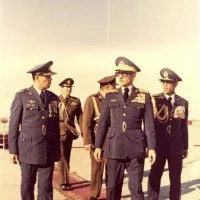Mohammad Reza Pahlavi, the Shah of Iran, departed Tehran on January 16, 1979 to seek medical treatment and to escape growing political unrest in the country he ruled. The Shah had consolidated his hold on power after the 1953 U.S.-backed overthrow of Mohammad Mossadegh and was considered a vital ally to the U.S., a leader… Read More "Finale of the Persian Monarchy and Prelude to the Iranian Revolution"
Persistence, Vision and Luck: Creating a Center for Diplomatic Training
Can you imagine the bureaucratic struggles involved in persuading the Department of Defense to hand over acres of prime real estate for a State Department training facility and then convincing Congress to authorize the transfer? This impossible dream was accomplished thanks to vision, persistence and a large dose of luck by a small group of… Read More "Persistence, Vision and Luck: Creating a Center for Diplomatic Training"
When Friends Spy on Friends: The Case of Jonathan Pollard
Former Navy intelligence analyst Jonathan Jay Pollard delivered over 800 highly classified documents to the Israeli government over a 17-month period. According to an article by Seymour Hersh published in the New Yorker, Pollard stole and sold militarily sensitive Signals Intelligence information, a year’s worth of memos by intelligence officers in the U.S. Navy’s Sixth… Read More "When Friends Spy on Friends: The Case of Jonathan Pollard"
The Chile Burn Victims Case: Containment vs. Human Rights under Pinochet
During a 1986 protest in Santiago, Chile against the human rights abuses of Augusto Pinochet’s regime, teenagers setting up barricades were arrested by a military patrol. What happened next to Rodrigo Rojas DeNegri (seen right) and Carmen Quintana is a matter of dispute, but in the end, Rojas was dead and Quintana severely burned. An… Read More "The Chile Burn Victims Case: Containment vs. Human Rights under Pinochet"
Cleaning up America’s Backyard: The Overthrow of Guatemala’s Arbenz
The Central Intelligence Agency launched a covert operation on June 18, 1954 to overthrow the left-leaning government in Guatemala. The coup, code-named Operation PBSUCCESS, deposed Guatemalan President Jacobo Árbenz Guzman, ended the Guatemalan Revolution and installed the military dictatorship of Carlos Castillo Armas. Armas would be the first in a series of U.S.-backed strongmen to… Read More "Cleaning up America’s Backyard: The Overthrow of Guatemala’s Arbenz"
Naming Names: U.S. Embassy Jakarta and Indonesian Purges 1965-1966
An article by an American reporter alleged that the U.S. embassy in Jakarta played a role in the Indonesian massacres of 1965-1966 by supplying a list of known communists to Major General Suharto (seen right), whose forces then hunted them down and killed them. The violence began when Communist forces killed six of Indonesia’s senior… Read More "Naming Names: U.S. Embassy Jakarta and Indonesian Purges 1965-1966"
Selwa Roosevelt: The Lucky Chief of Protocol
Selwa “Lucky” Roosevelt is best known for her role as Chief of Protocol of the United States from 1982 to 1989. After graduating from Vassar College in New York, Lucky pursued a career in journalism, covering social events in Washington D.C. She was invited to take the position of Chief of Protocol by Nancy Reagan…
I, Spy? Diplomatic Adventures during Soviet-American Détente
Among the challenges of serving as a U.S. diplomat in the USSR during the Cold War years of 1945 to 1991 were the certain knowledge that one’s words and actions were being monitored and reported back to the host – and often hostile – government. Intelligence gathering was carried out by both sides to learn… Read More "I, Spy? Diplomatic Adventures during Soviet-American Détente "
“Austria is Free!” Post-War Vienna Escapes the Soviet Bloc
May 15th, 1955, was a momentous occasion for a war-battered Europe, and for the national history of Austria as the Foreign Ministers representing the Occupying Powers gathered to sign the Austrian Independence Treaty. Leopold Figl, the former Chancellor and then the Foreign Minister, famously appeared on the balcony of Vienna’s Belvedere Palace (now home to a dazzling… Read More "“Austria is Free!” Post-War Vienna Escapes the Soviet Bloc"
A Crack in the Iron Curtain: Freeing Sharansky
As General Secretary of the Communist Party, Mikhail Gorbachev authorized the release of thousands of Soviet Jews who wanted to leave the USSR. In 1986 only 914 Soviet Jews were allowed to emigrate; by 1990 the number was 186,815. A group of about 11,000 who had been denied emigration visas were known as refuseniks. Natan Sharansky, a spokesperson for… Read More "A Crack in the Iron Curtain: Freeing Sharansky"

